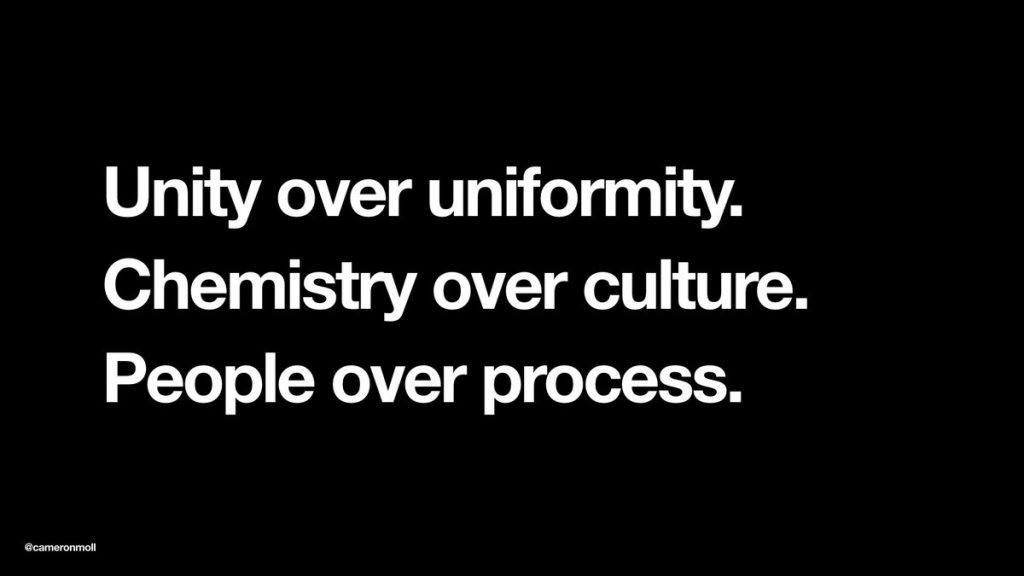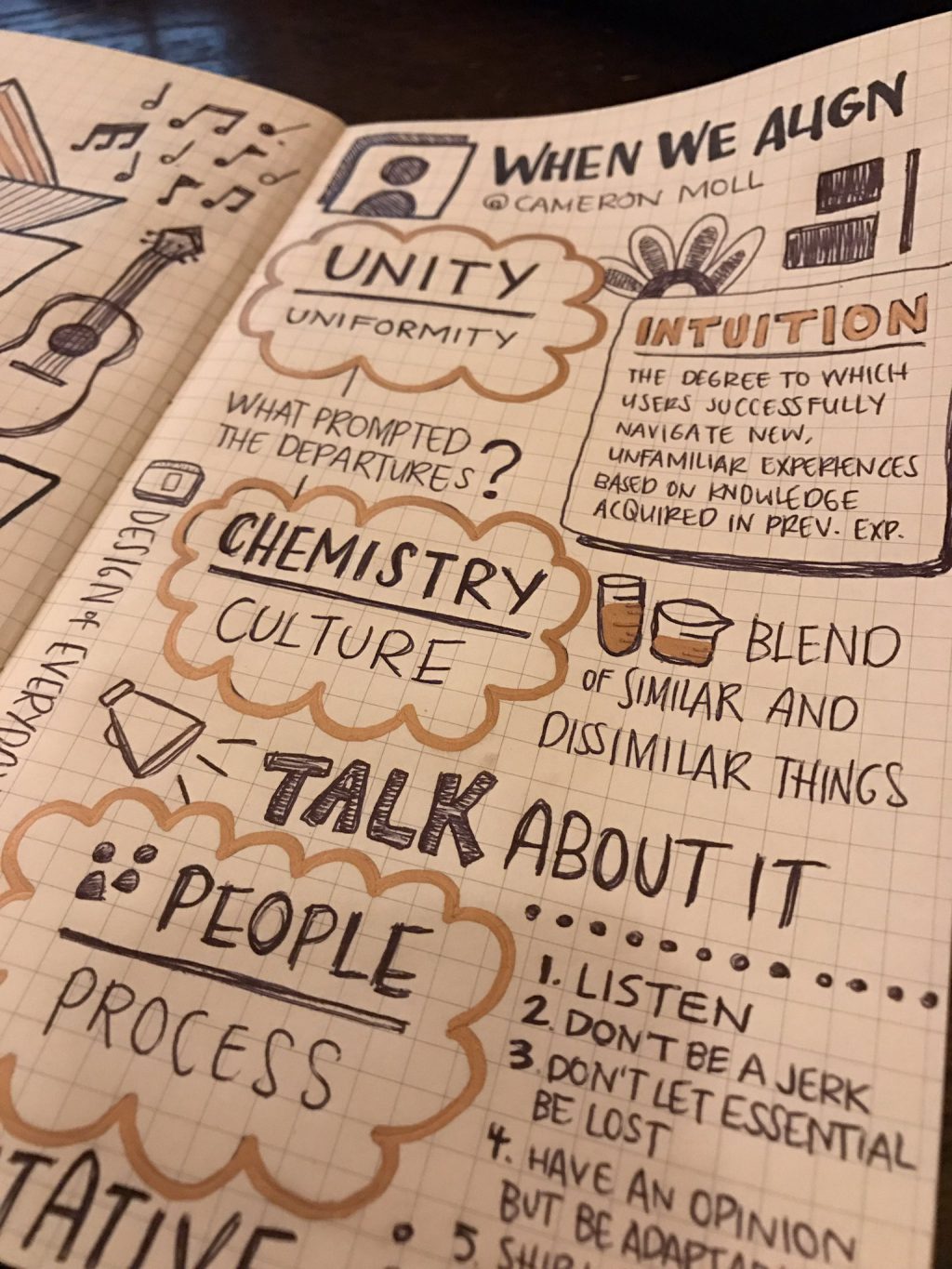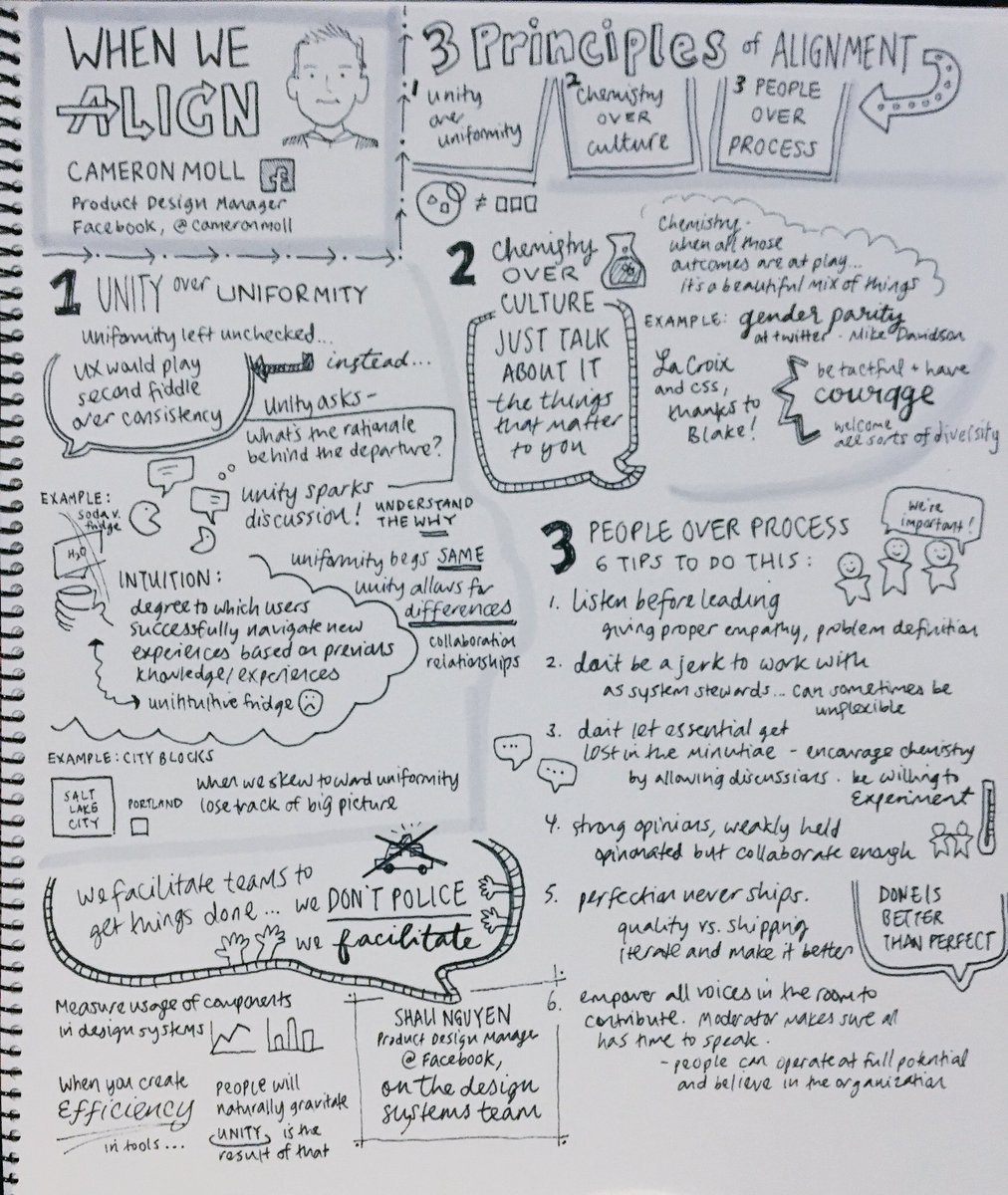Chemistry over Culture
An interesting discussion about the meaning of these two words, and possible implications in their use.

A few days ago I was attending Clarity Conf in San Francisco. The opening keynote was held by Cameron Moll — Product Design Manager at Facebook — and it was titled “When we align”. It was an interesting talk, though the jet lag was hitting hard on me so I didn’t take any note of the talk (and I am now trying to recollect things with fragmented details and memories).
During his talk, Cameron explained what are the principles that he follows in his work at Facebook. Of his presentation, one slide in particular (even better: one phrase) struck me:

Cameron suggested that “chemistry enables us to be different, where culture forces sameness”, a thing that he highlighted in a post a few months ago.
That phrase, and that sense of uneasiness that I’ve felt when I’ve heard it accompanied me for the whole day. During the happy hour in the foyer of the theater, while I was chatting with other attendees –Michael Fitzgerald of Interplay App, Jen Lee of Quora, Brian Bustos of H&R Block, Yuri Vetrov of Mail.Ru, and my colleague Ruslan Bayramkulov– the discussion fell on Cameron’s keynote. So I asked what were their thoughts on the “Chemistry over culture” phrase.
And this triggered a very intense discussion about the meaning of that phrase, that went on for quite a long (Michael had to listen to my tirade all the way long to the after-party a few blocks away 😬) with each one of us having a different take and interpretation of it.

Michael, Jen, and Brian (all native English speakers) were interpreting “Chemistry” in the common use of the word (in English) to describe some kind of relation and interaction between two or more people. Their position* was that Cameron was using it with that meaning, and to avoid to interpret Chemistry and Culture in a “semantic” way, as Cameron suggested in his talk
* ok, their position was more articulated than this, but again… the jet lag; so I hope they’ll forget me if I don’t report their exact words.
But I strongly disagreed with this position, with the idea that we can detach the words from their actual meaning, with the fact that we need more Chemistry and less Culture. So I’ll try to articulate here my thoughts, as Cameron asked me to do (hence this post).

I see a fundamental difference between Chemistry and Culture, and a potential danger in advocating that we need more of the first, less of the second.
Let’s start considering the word Chemistry as intended by Cameron, that is something that lies between two or more people (“There’s chemistry between us”), and let’s compare it with Culture, which is something that each one of us, in a way or another, carries within ourselves.
I hope you can see the risk here: while Chemistry is something I am not directly responsible for — it “just” may (or may not) happen, what can I do?—the Culture I bring with me is something I am responsible for (up to a certain extent of course, but still!).
My Culture (as well yours) is the result of many factors: the culture and the “environment” (family, school, society, nation, etc) in which we were raised up, the experiences we have collected (and processed) and the relations (the “chemical reactions”) we have established with other people during our lifetime, plus of course our own personality and individuality.
And this Culture is not something written in stone or fixed forever: it’s shaped, influenced, changed –whether we like it or not– by all the external factors I have mentioned above. But, at the same time, is also something that I can shape, adapt, change. To be a “better” person, to have “better” interactions with other people, to be a “better” citizen, father, colleague, husband, friend.
But this requires a lot of effort, introspection, self-examination, and criticism. Often requires us to question our ideas, our beliefs, even ourselves. In other words: to change.
Which not everybody is willing to do, I understand.
As Cameron highlighted in his talk, we need to attach an adjective to qualify it: “a positive team culture”, “a healthy company culture”, etc. But personally, I don’t see anything strange or wrong with it (in the same way that we can say of someone “he/she is a good person”).
The problem is not in the uniformity of culture in a company, or in the need to define what a “positive culture” is. The problem lies in the foundations that underlie it.
What are the values at its basis? How much are they shared amongst the people in the company, society, team, community? And how these values affect the relations between their members?
Because the fact that a Culture is based on shared values doesn’t automatically imply that this is a limit to the possibility of having diverse views, opinions, experiences, backgrounds, personalities, beliefs (as the Romans already understood a long time ago, when they built their empire: Roman Britain was ethnically diverse, almost by design).
Homogeneity (“sameness” in Cameron’s words) is not a necessary outcome of a common culture. On the contrary: if diversity and the common understanding of its benefits are a shared value, then this diversity will be pursued and valued and embraced by the members of the community.
The fact that often, despite a “shared” Culture, there is still a lack of diversity in our society and companies (as Cameron highlights), then it doesn’t mean that the solution lies in simply adding more “compounds” to the mix and let the Chemistry do its job.
Because this is the danger I see in the whole “Chemistry over Culture” thing: that because Chemistry is something external to me, it becomes an easy excuse that exonerates people from their responsibilities. “I have hired different people”, “I have diversified my team”, “I have a diverse company”, and my job is done, right? And if things don’t work out… well, then it’s not my fault: it’s because of the Chemistry that didn’t happen.
Well, what about the Culture that you are transmitting and fostering and cultivating in your team or company, from above, when you are the owner, the leader, the manager? What about the Culture that you are bringing to the table, when you are part of a team, an employee of a company, the member of a community?
As Cameron rightly said, things — and that is Culture, if you ask me — can change in a company, and this can start from everyone. So is everyone’s responsibility to create, influence, contribute to a “positive” culture.
Again, the problem is change and how much people are willing to accept it.
But Chemistry can’t become a self-exculpatory excuse for when we don’t change, for when we don’t ask for a change. As Brian suggested during the discussion, Chemistry is (can be) the outcome, the result of Culture. But it can’t simply replace it.
On a final note: even if we look at the face value of the word, Chemistry is a science (an exact science, moreover!). When comes to humans and human relations nothing is exact, or controllable or predictable*.
* we can imagine to use the “chemistry” between people to trigger a certain reaction, because we want to achieve a certain result or outcome (e.g. having two people working together, or having them competing one against the other) but we have to be careful: things can get out of control and become explosive.
Update:
Adding here for future reference:
“Relationships don’t scale. But culture does.” — @kimballscott (Radical Candor)